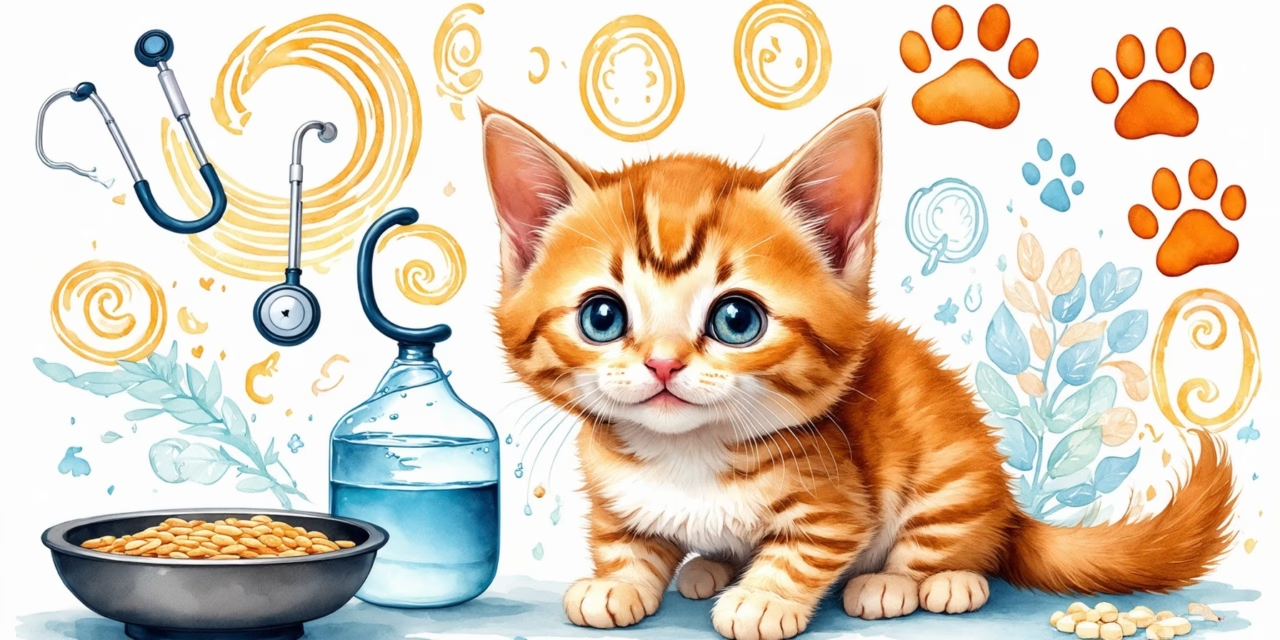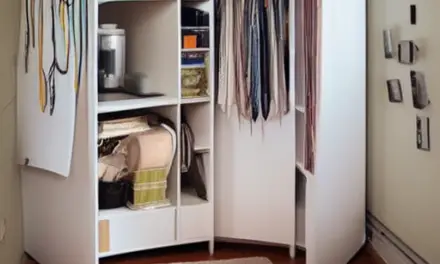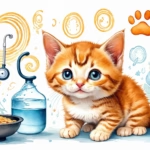Key Takeaways
- Understand Causes: Kittens may vomit due to eating too quickly, hairballs, dietary changes, or underlying health issues.
- Monitor Frequency: Occasional vomiting can be normal, but more than once a week may require veterinary attention.
- Hydration is Key: After vomiting, ensure your kitten stays hydrated to prevent dehydration and support recovery.
- Identify Symptoms: Look for accompanying signs like lethargy or diarrhea that indicate a need for immediate veterinary care.
- Diet Matters: Feeding a high-quality, appropriate diet and transitioning foods gradually can reduce vomiting incidents.
- Teething Effects: Vomiting may occur during teething, but persistent issues should be evaluated by a vet.
- Know When to Seek Help: If vomiting persists or is accompanied by blood, consult a veterinarian to rule out serious conditions.
Welcome to our comprehensive guide on kitten throwing up, where we delve into the various causes, care strategies, and essential actions to take when your feline friend experiences vomiting. Understanding why your cat is vomiting can be crucial for their health and well-being. In this article, we will explore key topics such as the normal frequency of vomiting in kittens, what to feed them after they throw up, and the potential health issues that may be indicated by their vomiting. Additionally, we will discuss the relationship between teething and vomiting, the significance of different types of vomit, and when to seek veterinary care. By the end of this article, you will be equipped with the knowledge to confidently address your kitten’s vomiting and ensure their health is prioritized. Let’s get started on understanding the complexities of kitten vomiting and what it means for your beloved pet.
Is it normal for a kitten to vomit?
Vomiting in kittens can be a common occurrence, but it is essential to understand the underlying causes and when to seek veterinary care. Here are key points to consider:
- Eating Too Quickly: Kittens often eat rapidly, which can lead to regurgitation. To mitigate this, consider using a slow feeder bowl to encourage more mindful eating.
- Ingestion of Foreign Objects or Hairballs: Kittens are curious and may consume non-food items like grass, toys, or hair, leading to gastrointestinal upset. Regular grooming can help reduce hairballs.
- Dietary Changes: Abrupt changes in diet can upset a kitten’s stomach. Gradually transitioning to new food over a week can help prevent vomiting.
- Frequency of Vomiting: Occasional vomiting may not be alarming, but if a kitten vomits more than once a week, it could indicate a health issue that requires veterinary evaluation.
- Accompanying Symptoms: Look for signs such as lethargy, weakness, decreased appetite, blood in the vomit, increased thirst or urination, and diarrhea. These symptoms warrant immediate veterinary attention.
- Duration of Vomiting: If vomiting persists for more than 24 hours, it is crucial to consult a veterinarian to rule out serious conditions.
- Type of Vomit: Vomit that is bloody or has a foul odor may indicate a severe underlying problem, such as infections or intestinal blockages.
- Health Conditions: Conditions like inflammatory bowel disease, pancreatitis, or even cancer can cause vomiting. Regular veterinary check-ups can help monitor your kitten’s health.
- Dehydration Risks: Kittens are particularly susceptible to dehydration due to their small size. Signs include dry gums and sunken eyes, which require immediate medical attention.
- Emergency Situations: If your kitten exhibits a bloated or painful abdomen, or if you have any concerns about their health, it is best to consult a veterinarian without delay.
Understanding these factors can help you manage your kitten’s health effectively. For more detailed guidance, consider consulting veterinary resources or professionals.
Understanding the frequency of vomiting in kittens
Occasional vomiting in kittens can be normal, but it’s crucial to monitor the frequency and context. If your kitten is throwing up undigested food or exhibiting other concerning symptoms, it may indicate a need for veterinary evaluation. Regularly assessing your kitten’s eating habits and overall health can help identify potential issues early on.
Common causes of kitten vomiting
Several factors can contribute to a kitten’s vomiting. Here are some common causes:
- Dietary Indiscretion: Kittens may eat inappropriate items, leading to gastrointestinal upset.
- Parasites: Conditions like roundworms in kittens can cause vomiting and require treatment.
- Infections: Viral or bacterial infections can lead to vomiting and other gastrointestinal symptoms.
- Food Intolerance: Some kittens may have sensitivities to certain ingredients, resulting in vomiting after meals.
By understanding these common causes, you can better address your kitten’s health and well-being. If vomiting persists or is accompanied by other symptoms, consulting a veterinarian is essential for proper diagnosis and treatment.

What Do You Give a Kitten After Vomiting?
When a kitten is throwing up, it’s essential to provide the right care to ensure a smooth recovery. Here’s a step-by-step guide on what to give a kitten after vomiting:
- Initial Care: After a kitten vomits, it is crucial to withhold food for 2-4 hours. This allows the stomach to settle and reduces the likelihood of further vomiting.
- Hydration: Ensure your kitten has access to fresh, clean water. Hydration is vital, especially after vomiting, as it helps prevent dehydration. Encourage your kitten to drink small amounts frequently.
- Bland Diet Introduction: If your kitten does not vomit again after the initial fasting period, gradually reintroduce food. Start with a teaspoon of bland, low-fat food such as boiled chicken or a specialized veterinary diet formulated for sensitive stomachs. Feed this every 2-3 hours for the first 24 hours.
- Monitor Symptoms: Keep a close eye on your kitten’s behavior and health. If vomiting persists, or if you notice other concerning symptoms such as lethargy, diarrhea, or a lack of appetite, consult a veterinarian immediately.
- Considerations for Health: It’s important to understand that vomiting can be a sign of various underlying health issues, including dietary indiscretion, infections, or parasites. Regular veterinary check-ups can help maintain your kitten’s overall health and well-being.
- Professional Guidance: For ongoing concerns about your kitten’s health, consider consulting with a veterinarian or a pet wellness coach. They can provide tailored advice and support for your kitten’s specific needs.
Importance of Hydration After a Kitten Throws Up
Hydration is a critical aspect of recovery for a kitten that has been vomiting. When a kitten throws up, it loses not only food but also essential fluids. Here’s why hydration is vital:
- Prevents Dehydration: Dehydration can quickly become a serious issue in kittens, especially if they are also experiencing diarrhea. Providing fresh water helps replenish lost fluids.
- Supports Recovery: Adequate hydration aids in the healing process and helps the digestive system function properly. It can also help flush out any toxins that may have caused the vomiting.
- Encourages Normal Appetite: A well-hydrated kitten is more likely to regain its appetite and resume normal eating habits, which is crucial for recovery.
For more information on kitten health and hydration, you can check resources from the American Veterinary Medical Association (AVMA) and PetMD.
Why is my kitten throwing up?
Kittens may throw up for several reasons, and understanding these can help you address the issue effectively. Here are the primary causes and solutions:
- Hairballs: Kittens, especially those with longer fur, can ingest hair while grooming, leading to hairballs. Regular brushing can significantly reduce the amount of hair they swallow. Aim to brush your kitten several times a week to minimize this issue.
- Eating Too Quickly: If your kitten eats their food too fast, it can lead to vomiting. To help slow down their eating, consider using a slow feeder bowl or spreading their food out on a flat surface. This encourages them to take their time and reduces the likelihood of regurgitation.
- Dietary Issues: Sometimes, the type of food can cause gastrointestinal upset. Ensure that you are feeding a high-quality kitten food that is appropriate for their age and size. Transitioning to a new food gradually over a week can help prevent digestive issues.
- Health Concerns: Frequent vomiting can also indicate underlying health problems, such as infections, parasites, or gastrointestinal disorders. If your kitten vomits regularly or shows other signs of illness (like lethargy or diarrhea), consult a veterinarian for a thorough examination.
- Stress or Anxiety: Changes in the environment or routine can stress kittens, leading to vomiting. Providing a stable environment and gradual introductions to new situations can help reduce anxiety.
If your kitten’s vomiting persists despite these interventions, it is crucial to seek veterinary advice to rule out any serious health issues. Regular check-ups can help ensure your kitten remains healthy and happy.
Identifying underlying health issues causing vomiting
When a kitten is throwing up, it’s essential to monitor their overall health. Persistent vomiting can be a sign of serious conditions such as:
- Parasites: Roundworms and other intestinal parasites can lead to vomiting in kittens. Regular deworming is crucial; consult your veterinarian for the best kitten worm treatment.
- Infections: Viral or bacterial infections may cause gastrointestinal upset, leading to vomiting. If your kitten exhibits other symptoms like fever or lethargy, immediate veterinary attention is necessary.
- Gastrointestinal Disorders: Conditions such as inflammatory bowel disease or food allergies can result in vomiting. A vet can help diagnose these issues through tests and recommend appropriate dietary changes.
Always keep an eye on your kitten’s behavior and eating habits. If they are throwing up undigested food or showing signs of distress, it’s best to consult a veterinarian.
The role of diet in kitten vomiting
The diet you provide plays a significant role in your kitten’s digestive health. Here are some dietary considerations to prevent vomiting:
- High-Quality Food: Ensure you are feeding a nutritious, high-quality kitten food that meets their developmental needs. Look for brands that list meat as the first ingredient and avoid fillers.
- Gradual Food Changes: If you need to switch your kitten’s food, do so gradually over a week to avoid upsetting their stomach. Sudden changes can lead to vomiting.
- Portion Control: Overfeeding can lead to vomiting. Follow the feeding guidelines on the food packaging and adjust portions based on your kitten’s growth and activity level.
By focusing on a balanced diet and being mindful of your kitten’s eating habits, you can significantly reduce the chances of vomiting and promote overall health.
Do Kittens Throw Up When Teething?
Kittens can indeed experience vomiting during the teething process, but it’s essential to understand the context and what is considered normal. Teething typically begins around 3 to 4 months of age, involving the shedding of baby teeth and the emergence of adult teeth, which can cause discomfort and pain. While occasional vomiting may occur due to the stress of teething or swallowing hair and debris while chewing, persistent vomiting may indicate other health issues and should be addressed by a veterinarian.
Teething Symptoms in Kittens and Their Effects on Digestion
- Drooling: Increased saliva production is common as kittens chew to alleviate discomfort.
- Vomiting: While some vomiting can occur, it’s crucial to monitor the frequency. If your kitten is throwing up undigested food or showing signs of distress, consult a veterinarian.
- Behavioral Changes: Kittens may exhibit signs of distress, such as shaking or excessive meowing, due to pain.
How to Care for a Teething Kitten Experiencing Vomiting
Managing a teething kitten who is vomiting involves providing comfort and monitoring their health closely. Here are some effective strategies:
- Chew Toys: Provide soft, safe toys specifically designed for teething. Options include rubber toys, soft stuffed animals, or cardboard, which can help soothe their gums. For more on suitable toys, check out our article on cat chew toys.
- Cold Treats: Chilling toys or offering cold, soft treats can provide additional relief for sore gums.
- Veterinary Consultation: If vomiting is frequent or accompanied by other concerning symptoms, consult a veterinarian to rule out underlying health issues. Resources like the AVMA can provide further guidance on kitten health.
Being attentive to your kitten’s needs during this phase is crucial. If your kitten is throwing up frequently or showing other unusual behaviors, it’s important to seek veterinary advice to ensure their health and well-being.

What does it mean when a kitten throws up liquid?
When a kitten throws up liquid, it can indicate several underlying issues that warrant attention. Understanding the color and consistency of the vomit is crucial for determining the cause:
- Clear Liquid: This often suggests that the kitten’s stomach is empty. Kittens may vomit clear liquid if they have not eaten for a while or if they are experiencing nausea. It’s common for them to vomit clear liquid before or after expelling a hairball.
- Yellow Liquid (Bile): Yellow vomit typically indicates the presence of bile, which can occur when a kitten has not eaten for an extended period. This can also happen if they have a gastrointestinal upset or are experiencing stress.
- White Foam: White foamy vomit may suggest that the kitten is experiencing an upset stomach or has ingested something irritating. This can also occur if they have been excessively grooming and swallowing hair.
It’s essential to monitor the situation closely, as the type of liquid vomited can provide insights into the kitten’s health.
Possible Causes of Liquid Vomiting in Kittens
Several factors can contribute to a kitten throwing up liquid:
- Hairballs: Kittens often groom themselves, leading to hairballs that can cause vomiting.
- Dietary Issues: Sudden changes in diet or food intolerances can lead to vomiting. If your kitten is throwing up undigested food, it may be time to reassess their diet.
- Parasites: Intestinal parasites can cause gastrointestinal distress, leading to vomiting. Regular veterinary check-ups and fecal exams are recommended to rule this out. For more information, check out kitten worm treatment.
- Ingestion of Foreign Objects: Kittens are curious and may ingest non-food items, leading to blockages or irritation.
When to Seek Veterinary Care for Liquid Vomiting
If vomiting persists, is accompanied by other symptoms such as lethargy, diarrhea, or loss of appetite, it is essential to consult a veterinarian. Early intervention can prevent more serious health issues. For further insights on kitten health and wellness, consider resources from reputable veterinary organizations like the ASPCA or consult with a veterinarian for tailored advice.
What is the fading kitten syndrome?
Fading Kitten Syndrome (FKS) is a critical condition affecting neonatal kittens, particularly between birth and weaning (approximately 4-5 weeks of age). Understanding FKS is essential for cat owners and breeders to ensure the health and survival of vulnerable kittens.
Understanding fading kitten syndrome and its symptoms
Kittens are most susceptible to FKS during their first few weeks of life, a time when they are heavily reliant on maternal care for warmth, nutrition, and immune support. Symptoms of FKS may include:
- Lethargy and weakness
- Weight loss or failure to gain weight
- Difficulty suckling or reduced appetite
- Low body temperature (hypothermia)
- Pale gums or tongue
- Excessive crying or mewing
- Dehydration
- Diarrhea or constipation
- Bloated abdomen
- Difficulty breathing
Preventative measures and care for at-risk kittens
The syndrome can arise from multiple factors, including:
- Hypothermia: Inadequate body temperature can lead to metabolic issues.
- Hypoglycemia: Low blood sugar levels can result from insufficient feeding.
- Congenital Defects: Genetic abnormalities may predispose kittens to health issues.
- Infections: Bacterial or viral infections can compromise a kitten’s health.
- Other Health Issues: Underlying conditions may also contribute to the syndrome.
Recognizing the signs of FKS and seeking veterinary care promptly is crucial. Early intervention can significantly improve survival rates. Supportive care may include maintaining body temperature through warming techniques, providing fluids to combat dehydration, and ensuring adequate nutrition through feeding assistance. For more information on kitten care, you can visit kitten worm treatment and PetMD.
Kitten throwing up: When to be concerned
Understanding when a kitten throwing up is a cause for concern is crucial for any pet owner. While occasional vomiting can be normal, especially in young kittens, there are specific signs that indicate a more serious health issue. Recognizing these signs early can lead to timely veterinary intervention and better outcomes for your kitten.
Signs that indicate a serious health issue in vomiting kittens
When assessing a kitten that is throwing up, it’s important to look for the following signs that may indicate a serious health issue:
- Frequent vomiting: If your kitten is vomiting multiple times a day, this could signal an underlying health problem.
- Vomiting undigested food: If your kitten throws up undigested food, it may indicate a blockage or digestive issue.
- Presence of blood: Any blood in the vomit, whether bright red or resembling coffee grounds, is a serious concern and requires immediate veterinary attention.
- Accompanying symptoms: If your kitten is also experiencing diarrhea, lethargy, or loss of appetite, these symptoms combined with vomiting can indicate a more severe condition.
- Age and health history: Kittens under six months old or those with pre-existing health conditions are at a higher risk for serious issues when vomiting occurs.
The importance of veterinary consultation for persistent vomiting
If your kitten is persistently vomiting, it is essential to consult a veterinarian. A professional can conduct a thorough examination and may recommend diagnostic tests such as blood work or imaging to determine the cause of the vomiting. Early intervention can prevent complications and ensure your kitten receives the appropriate treatment. Additionally, if your kitten is throwing up worms or showing signs of dehydration, immediate veterinary care is crucial.
For more information on kitten health and care, you can visit the ASPCA or the AVMA for reliable pet health resources.
Understanding the signs of serious health issues and the importance of veterinary consultation can help you keep your kitten healthy and happy. If you notice any concerning symptoms, don’t hesitate to reach out to your veterinarian.













